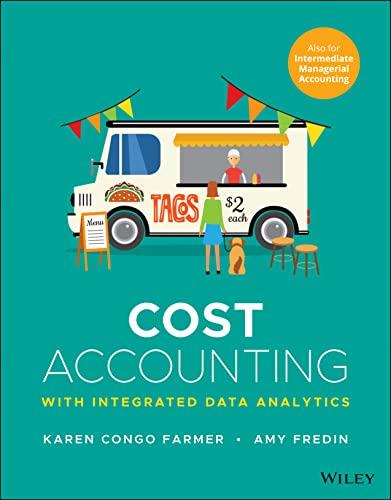Question
Having problem with this assignment, William Smith (age 50) is married; his wife Susan (age 45) is a lawyer, and her net income in the
Having problem with this assignment,
William Smith (age 50) is married; his wife Susan (age 45) is a lawyer, and her net income in the current year is $75,000. They have two children, Jeremy, 19 years old, and Jonathan, 17 years old. Jonathan is in high school, while Jeremy commenced university this year.
- Jeremy was a full-time student enrolled in post-secondary level courses at a university in Canada from September 1 to December 31 of the current year; Jeremy had no income in the year. Mr. Smith paid Jeremys eligible tuition fees of $3,500; Jeremy wants to maximize the transfer (tuition, education and textbook amounts) to his father.
- Mr. Smith is employed by ABC Corporation, a Canadian public corporation, as an engineer. He received a salary of $80,000 in the current year from which the following amounts were withheld:
| Withholding Category | Amount |
| Income taxes | $20,000.00 |
| C.P.P. | (maximum for the year) |
| E.I. | (maximum for the year) |
| Charitable donations | 1,200 |
Mr. Smith had the following other receipts in the current year:
- Received $1,200 in dividends (the actual amount of dividends received) from Boots Ltd., a Canadian public corporation.
- Received $3,000 interest earned on a term deposit held at the TD Bank.
- Received a net amount of $1,750 in dividends from Nexus Inc., a U.S. public corporation, which represents $2,000 in dividends and $250 in U.S. taxes paid (all figures have been translated into Canadian dollars).
Mr. Smith made the following disbursements in the current and following years:
- On December 1 of the current year, he made a donation to the United Way, a registered charity, in the amount of $400.
- Current year political donations: Federal Liberal Party: $300 and Alberta Liberal Party: $300.
- William incurred the following medical expenses during the current year:
| Medical Category | Expense |
| Orthodontic work for Jonathan (braces removed): | $5,475 |
| New prescription eye glasses for Jeremy: | 1,250 |
| Prescription medication for Susan (50% covered by private health care): | 475 |
| Prescription medication for William (50% covered by private health care): | 785 |
| Private health care premiums: | 1,500 |
Mr. Smith was a shareholder in Winless Ltd., a Canadian-controlled private corporation and a small business corporation, which went into receivership (bankruptcy) in November of the current year. At that time, Winless Ltd. owed Mr. Smith $19,000 (the balance in the shareholder loan account). Mr. Smith also advises you that he purchased the shares of Winless Ltd. 15 years ago for $1,000.
Mr. Smiths father passed in the prior year. Mr. Smith received the following at the time of his fathers death:
|
| Fathers ACB | FMV at Fathers Death |
| 100 shares of XYZ Ltd. (a public co.) | $600 | $2,200 |
| Cash from his fathers estate | 40,000 | |
Mr. Smith sold the shares in XYZ Ltd. on November 1 of the current year for $3,150 and paid brokerage commission of $150 on the sale.
A review of Mr. Smiths prior years tax return provides the following information:
- Losses carried forward at December 31: Net allowable capital loss = $1,500
Answer the following:
- Calculate Mr. Smiths net income (in accordance with Section 3 of the ITA) and taxable income for the current year. Show all your calculations.
- Compute Mr. Smiths Part 1 federal taxes payable for the current year.
- William asks you about the rules for application of loss carryovers. Explain the loss-carryover rules for a) capital losses and b) non-capital losses.
- William found some medical expense receipts from two years ago that he would like to claim on his current years tax return since he has heard that you can claim medical expenses from other tax years. Can you explain to William the rules regarding calculating the medical expense tax credit and how medical expenses from other taxation years can be utilized to maximize the current years medical expense tax credit?
- William has heard about the lifetime capital gains deduction and would like to know what kind of properties qualify for this tax treatment? Would it be possible for William to sell his shares in Boots Ltd. and not pay any tax on this disposition by utilizing the lifetime capital gains deduction?
- William provides you with a copy of the tax returns for his wife, Susan, and son, Jeremy. A review of their tax returns indicates that they both made charitable donations in the current year, with Susans total donations being $600 to the family church, while Jeremy made a donation to Movember (prostate cancer campaign) for $100. Should William claim these charitable donations? Explain why or why not. Advise William about tax planning for charitable donations made by family members.
- In the prior year, William assisted his father in filing his personal income tax return. Williams father is a 77-year-old widower and his only sources of income are investment income, Canada Pension Plan benefits, and Old Age Security. William noticed that his father was paying federal and provincial tax in addition to something called tax payable under Part I.2. William wants to know what Part 1.2 tax is, and why his father is subject to this additional tax in the current year.
Step by Step Solution
There are 3 Steps involved in it
Step: 1

Get Instant Access to Expert-Tailored Solutions
See step-by-step solutions with expert insights and AI powered tools for academic success
Step: 2

Step: 3

Ace Your Homework with AI
Get the answers you need in no time with our AI-driven, step-by-step assistance
Get Started


